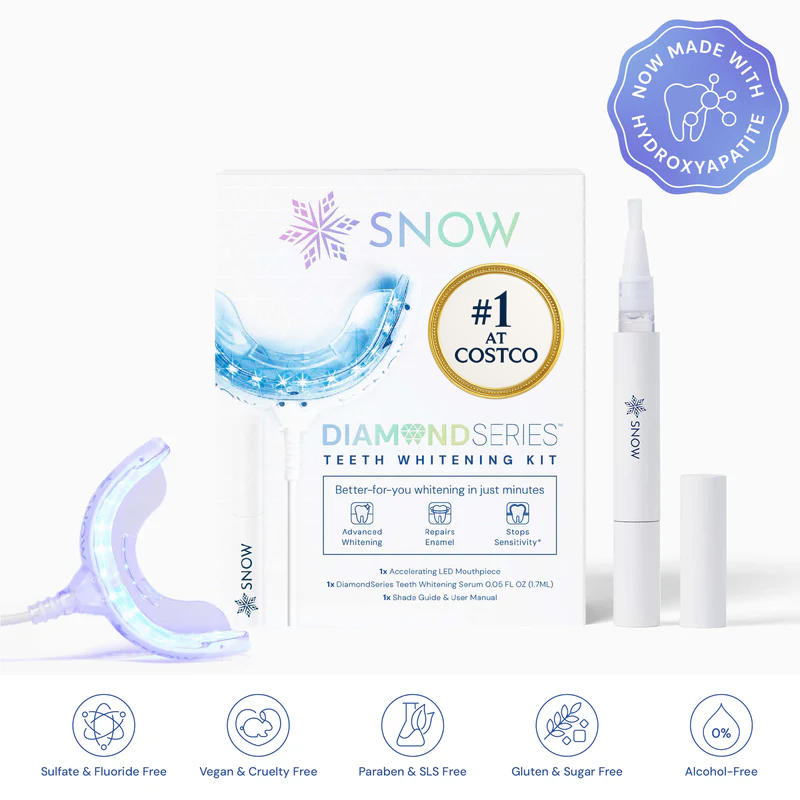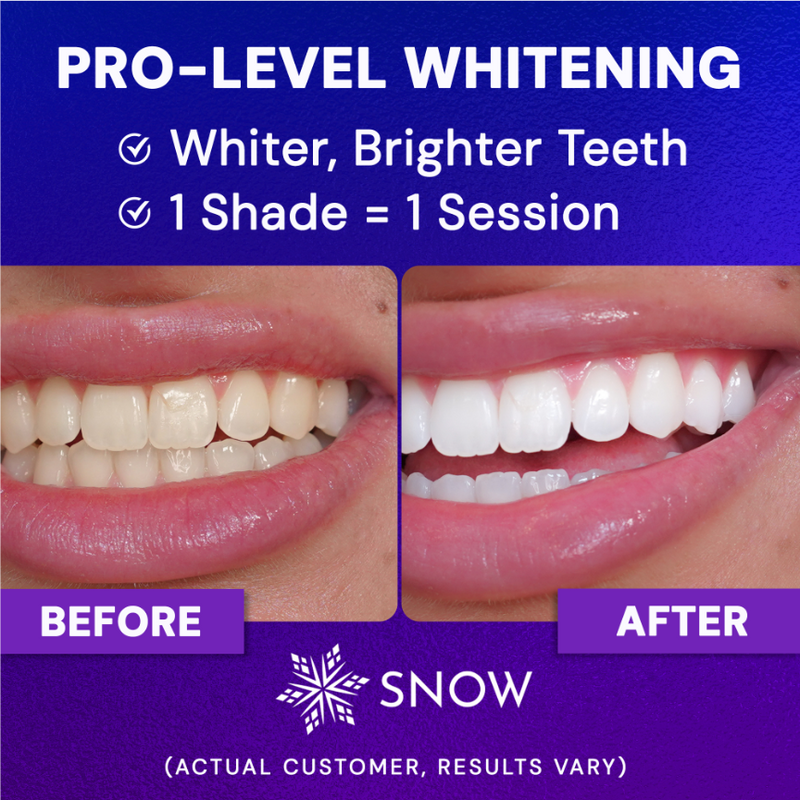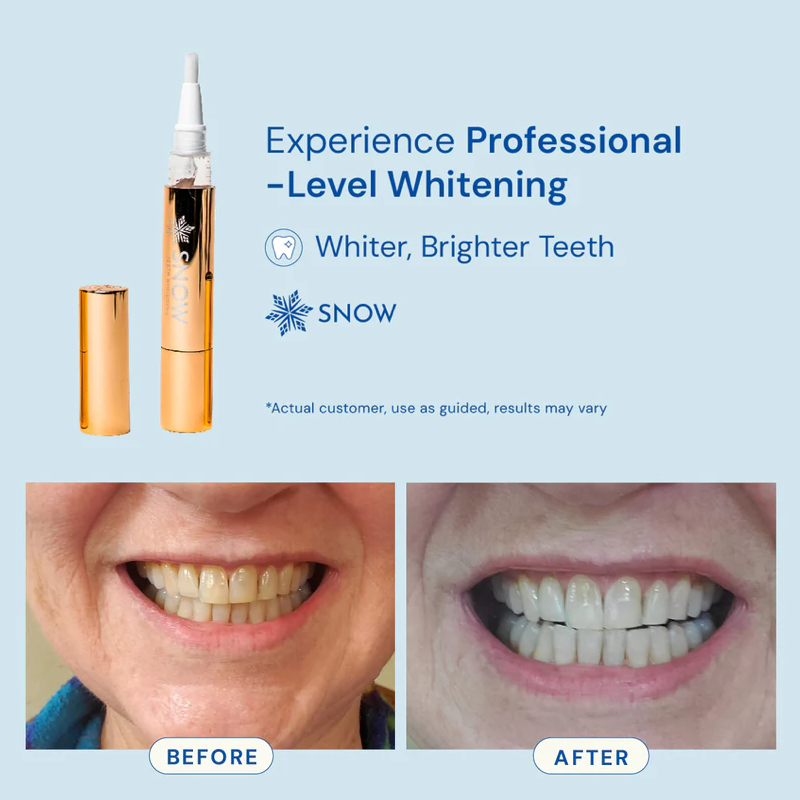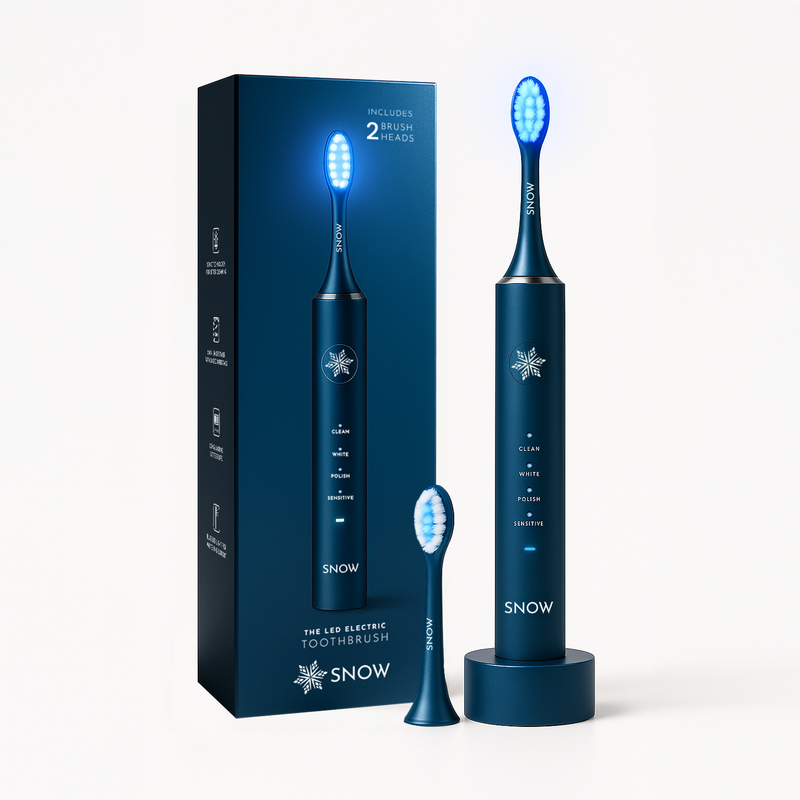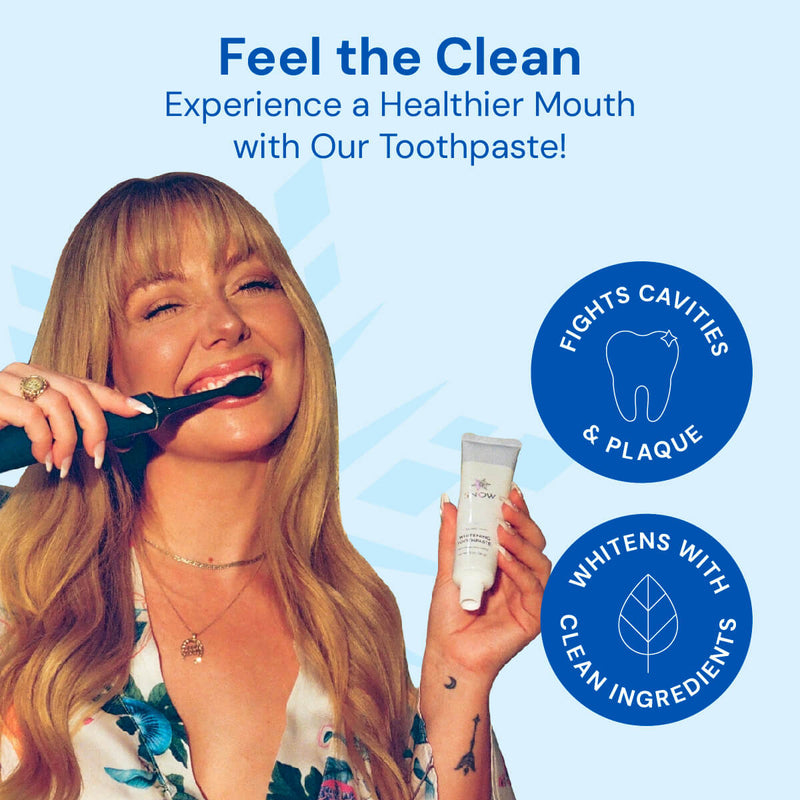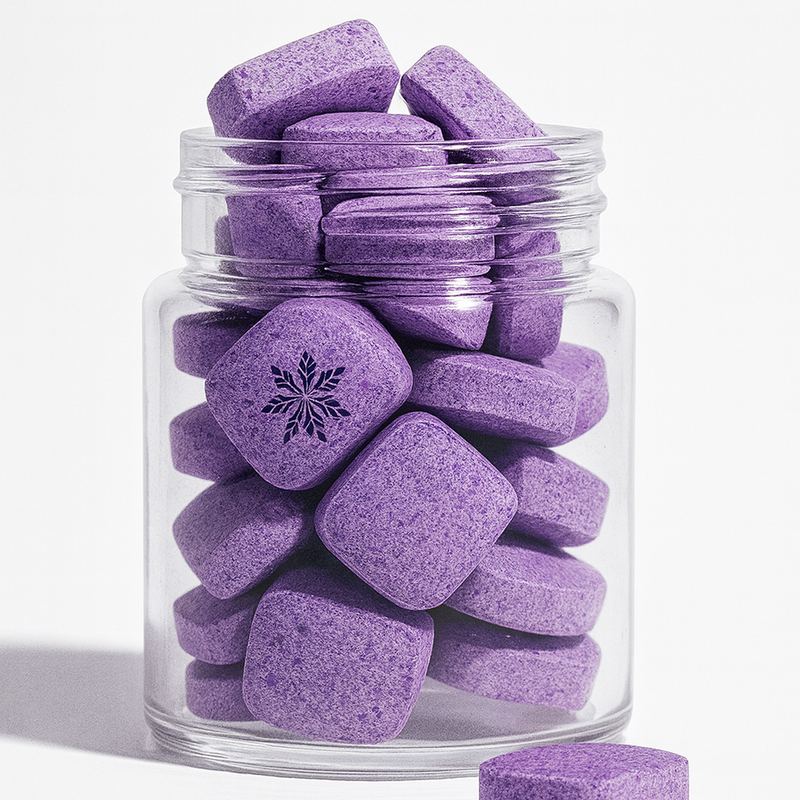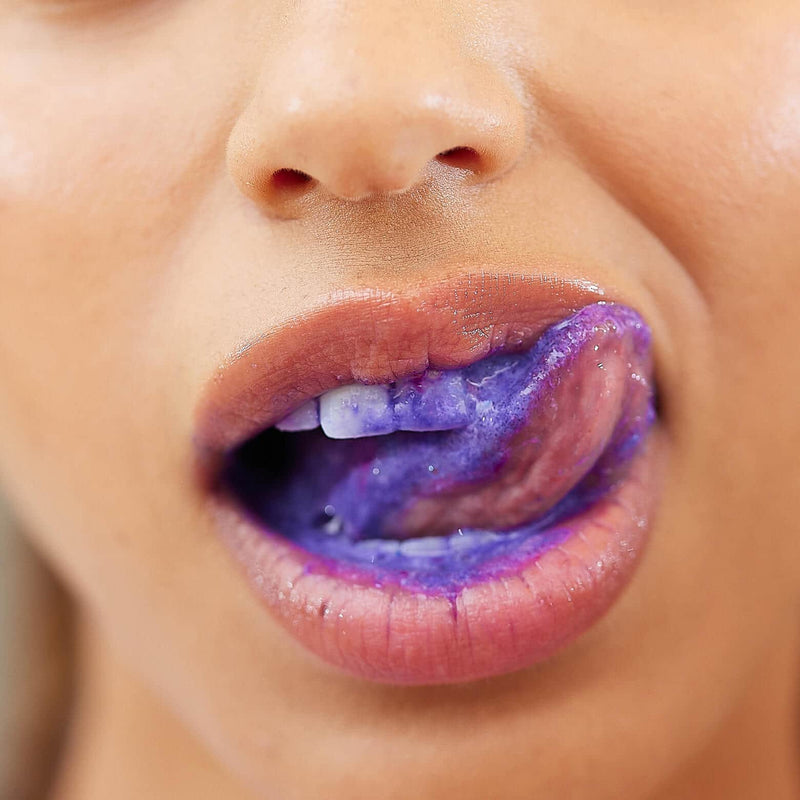Finding the right toothpaste can be confusing, especially when you are weighing fluoride-based options against newer alternatives. Fluoride toothpaste, whether it contains sodium fluoride or stannous fluoride, has long been praised for protecting against dental caries. However, concerns about long-term exposure and increasing reports of tooth sensitivity have raised questions about its safety. As oral health becomes a growing priority, more people are exploring hydroxyapatite toothpaste. Known for remineralizing initial caries lesions and supporting overall dental health, it offers a gentle but effective alternative. This guide will help you compare both options and choose the one that fits your needs best.
Key Takeaways
-
Fluoride toothpaste is widely recognized for its cavity-preventing properties, while hydroxyapatite toothpaste serves as a non-toxic alternative that effectively remineralizes enamel.
-
Both fluoride and hydroxyapatite toothpastes promote the remineralization of enamel and reduce tooth sensitivity, with studies showing similar efficacy in cavity prevention.
-
Safety concerns regarding fluoride, especially in children and pregnant women, make hydroxyapatite an increasingly popular choice for those seeking a natural and safer dental care option.
Understanding Fluoride Toothpaste
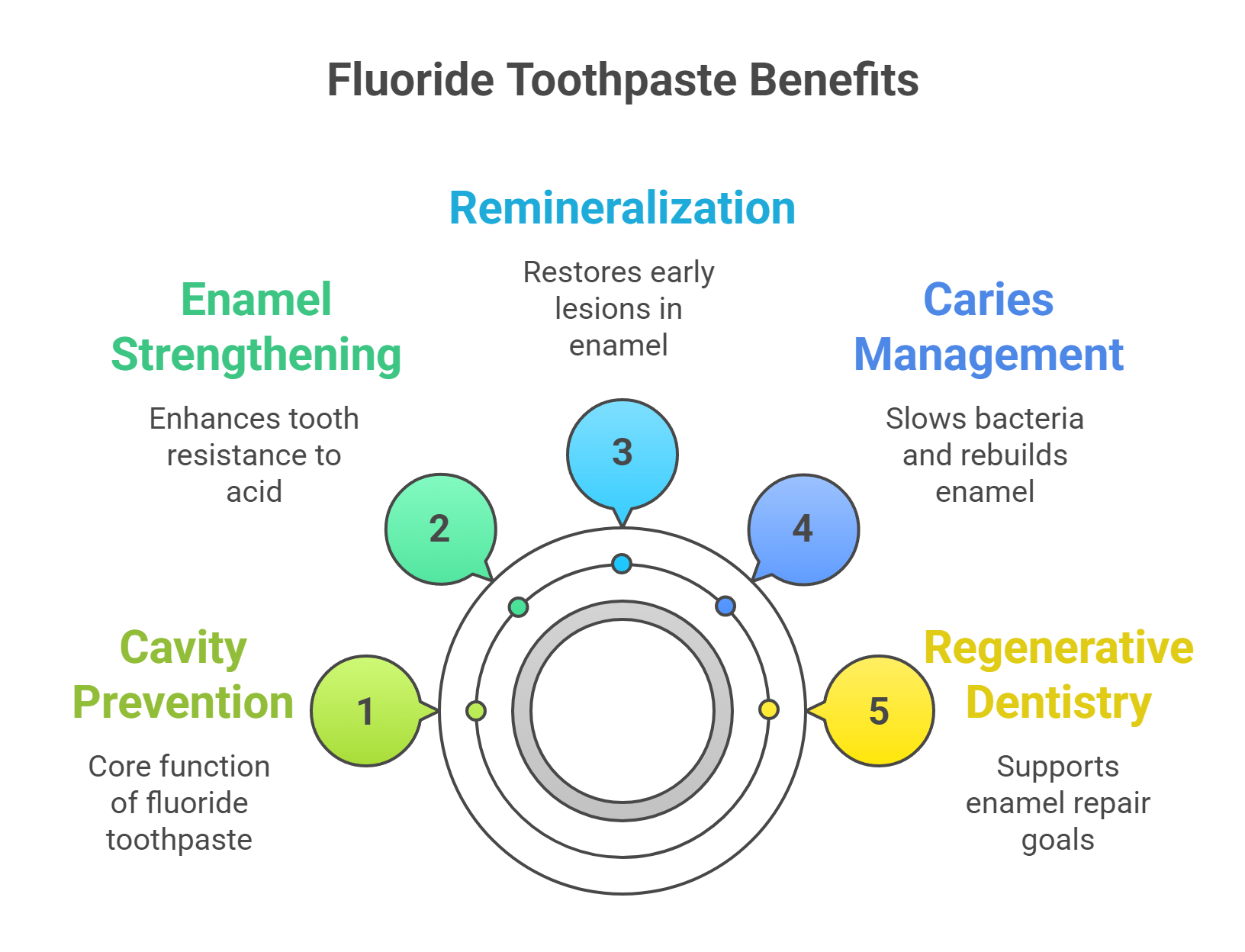
Fluoride toothpaste is one of the most widely used dental products in the world, known for its strong role in cavity prevention and overall oral health. It's been recommended for decades thanks to solid evidence showing how well it protects teeth and prevents dental caries.
What Is Fluoride and How Does It Work?
Fluoride is a naturally occurring mineral found in water, soil, and certain foods. According to the National Institutes of Health, it helps strengthen bones and teeth by supporting the buildup of mineral density. Once inside your body, fluoride gets stored mostly in bones and teeth, especially in children. In fact, up to 80% of absorbed fluoride in children is retained for long-term use in the body.
In toothpaste, fluoride works by bonding with the natural structure of your enamel. It forms a stronger material called fluorapatite, which makes your teeth more resistant to acid and wear. This is key to enhanced remineralization, helping to restore early initial lesions before they become cavities.
Why Fluoride Is Still a Top Choice
Fluoride plays a major role in caries management by doing two things at once: it slows down harmful bacteria and helps rebuild enamel. Its effectiveness in cavity prevention has been confirmed by decades of research and is still a trusted recommendation by dentists worldwide.
Plus, fluoride toothpaste supports regenerative dentistry goals by aiding in enamel repair. While many people are exploring hydroxyapatite based toothpaste for a more natural feel, fluoride remains a gold standard. Its benefits are well supported by biomimetic oral care principles and ongoing research, even if clinical human studies continue to evolve.
How Fluoride Toothpaste Works
Fluoride toothpaste helps protect your teeth by doing more than just cleaning them. It creates a mineral-rich environment in your mouth that supports overall oral health and actively repairs damage before it turns into something worse.
Here’s how it works:
-
Fluoride ions penetrate the enamel, especially in areas weakened by acid.
-
These ions bond with your enamel to form fluorapatite, a much harder material than your enamel’s natural structure.
-
This helps repair enamel, making it stronger and more resistant to acid erosion and weakened enamel.
-
It also blocks harmful bacteria by lowering their activity and limiting their acid production.
According to the National Institutes of Health, fluoride supports teeth through three key actions:
-
It inhibits demineralization, helping prevent enamel from breaking down.
-
It promotes remineralization, bringing minerals like calcium and phosphate back into the enamel.
-
It inhibits plaque bacteria, disrupting their ability to produce cavity-causing acids.
Fluoride works best when used topically, like in toothpaste, mouthwash, or varnish, rather than through supplements. This surface contact is what allows fluoride to stay close to the enamel and keep working long after brushing.
This ability to strengthen enamel and fight decay is why fluoride toothpaste is still a go-to in orthodontic treatment and cavity prevention. It’s especially effective in areas with early signs of decay, helping reverse initial lesions and protect against further damage.
Daily use of fluoride toothpaste supports strong teeth, fewer cavities, and better defense against dental caries, a major win for your long-term oral health.
Benefits of Using Fluoride Toothpaste
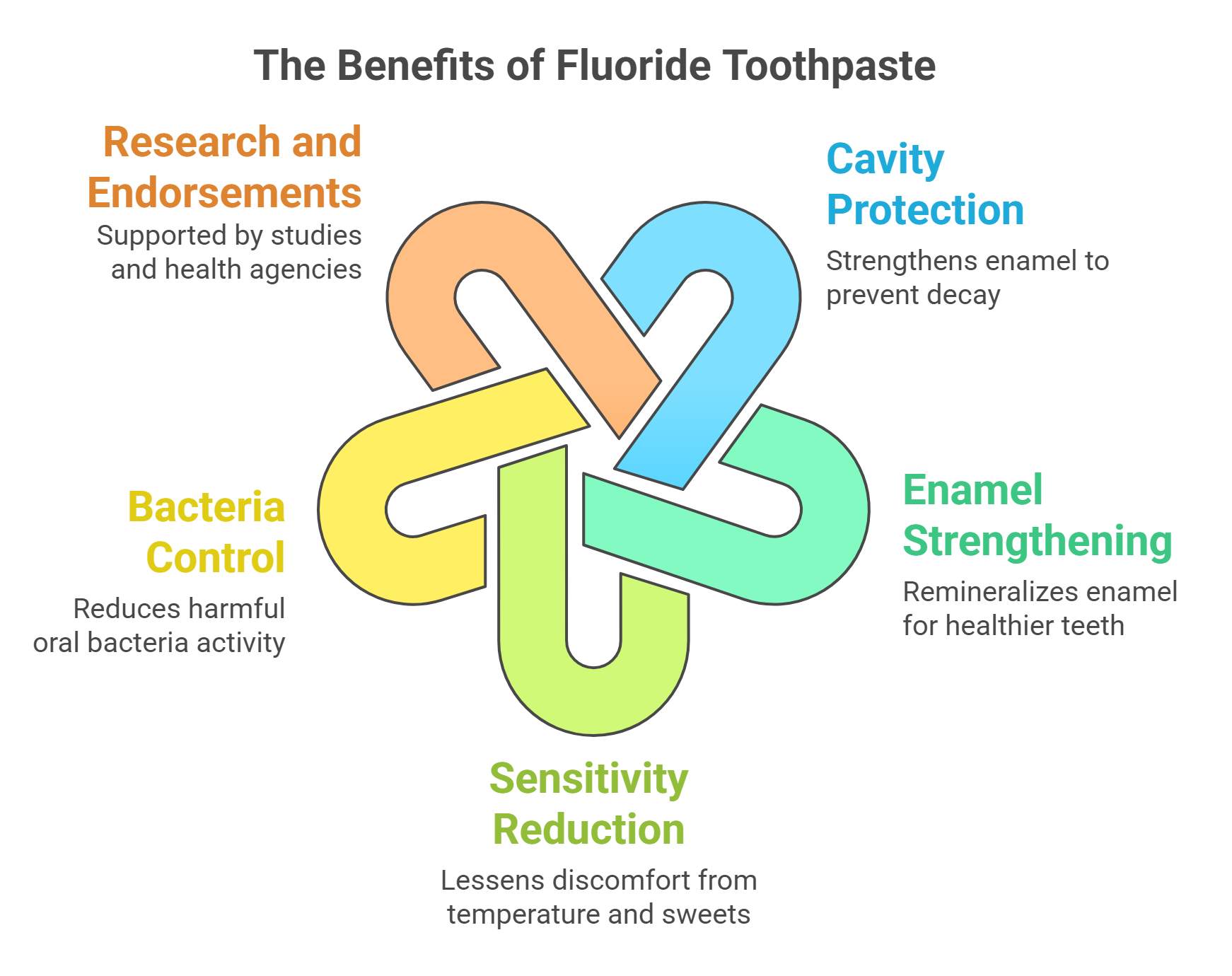
Fluoride toothpaste plays a major role in cavity prevention and is widely recommended by dental professionals for everyday oral care. Its main benefits include:
-
Protecting against cavities: Fluoride strengthens tooth enamel and helps reverse early decay, reducing the risk of dental caries. This makes it one of the most reliable tools in caries management.
-
Strengthening enamel through remineralization: It helps rebuild areas of weakened enamel, promoting healthier teeth with regular use.
-
Reducing tooth sensitivity: By reinforcing enamel, fluoride can lessen discomfort from hot, cold, or sweet foods.
-
Fighting bacteria that cause decay: It reduces the metabolic activity of harmful oral bacteria, helping to control dental caries more effectively.
-
Backed by research and endorsements: Numerous studies and public health agencies support fluoride use in toothpaste formulations, making it a well-established choice in oral hygiene.
Potential Side Effects of Fluoride Toothpaste
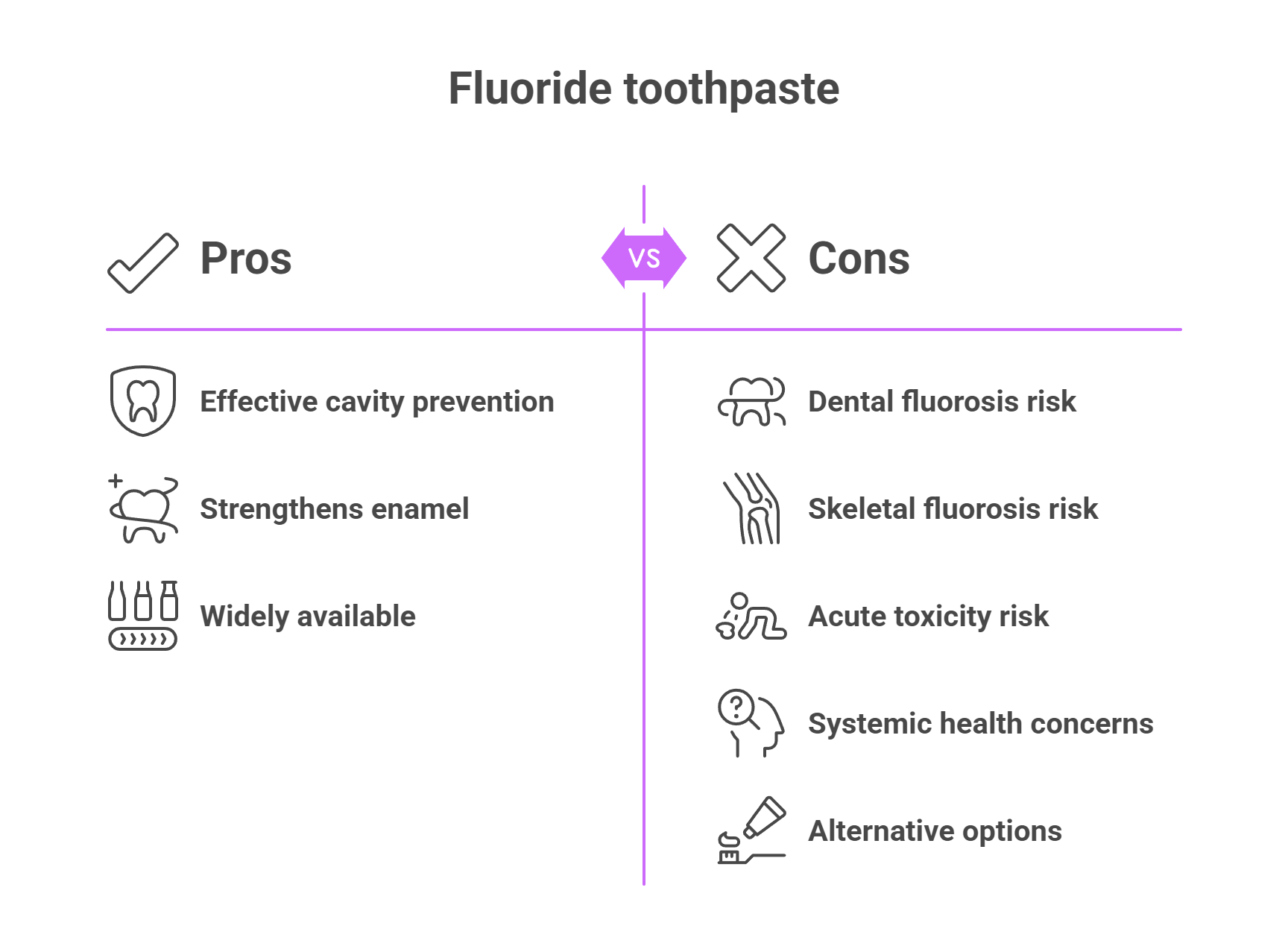
While fluoride toothpaste is effective, it may carry side effects, especially with overuse:
-
Dental fluorosis: Caused by swallowing too much fluoride during childhood. It can appear as white spots, discoloration, or even pitting of the enamel.
-
Skeletal fluorosis: A rare but serious condition from long-term fluoride overexposure, which may lead to joint pain, stiffness, and skeletal changes.
-
Acute fluoride toxicity: In very large amounts (such as ingesting toothpaste), it may cause symptoms like nausea, vomiting, or even serious complications. This is extremely rare when used correctly.
Systemic health concerns: Ongoing research is exploring potential links between fluoride and effects on the brain, especially in children. These findings have led some families to consider fluoride-free alternatives.
For individuals seeking a gentler or biocompatible solution, hydroxyapatite toothpaste offers a promising path without many of the concerns tied to fluoride.
What is Hydroxyapatite Toothpaste?
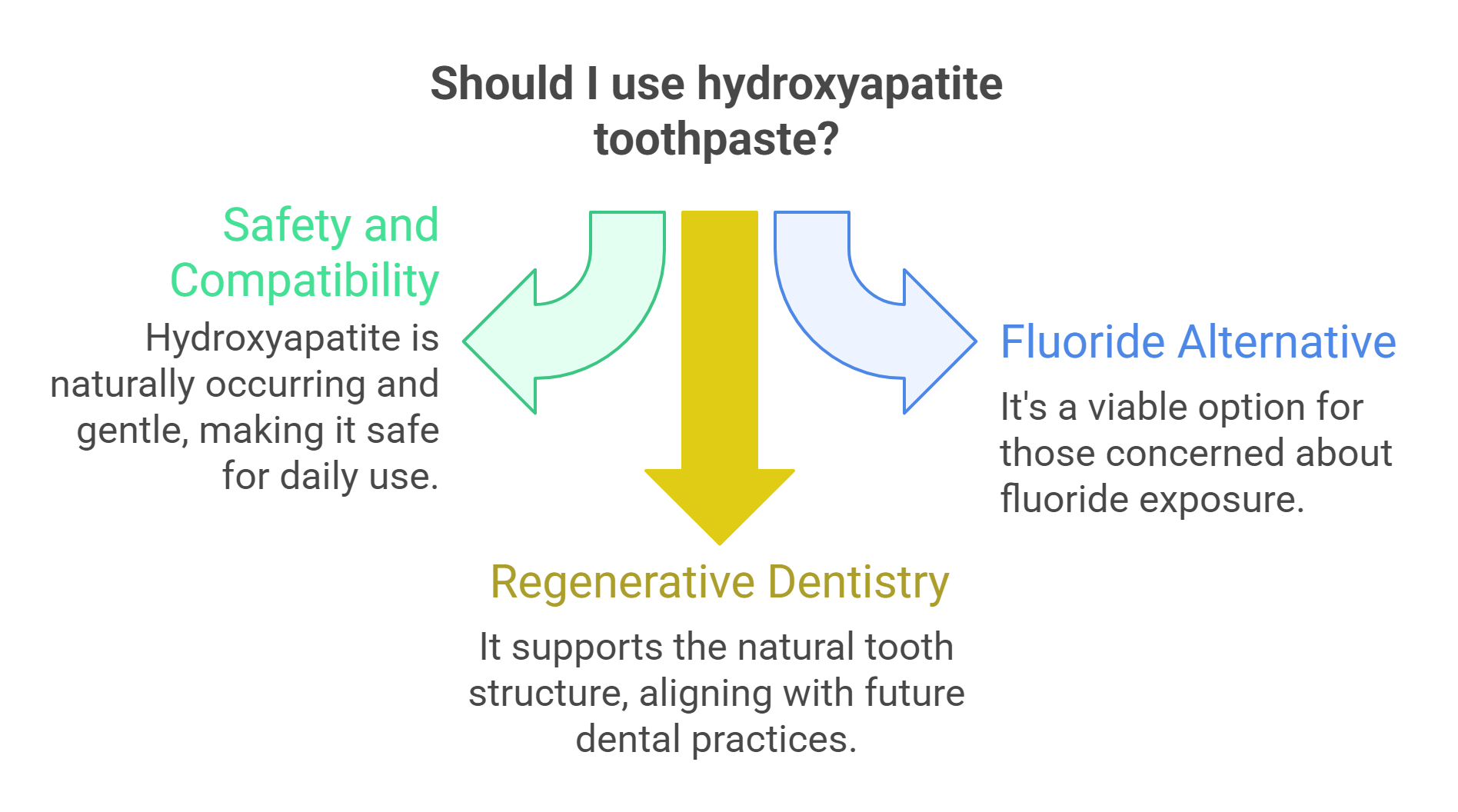
Hydroxyapatite toothpaste is gaining attention as a safe and science-backed alternative to fluoride. It’s made with hydroxyapatite, a naturally occurring mineral that already exists in your teeth and bones. Because it’s so similar to what your enamel is made of, this ingredient is incredibly compatible with your body and gentle enough for everyday use.
Originally developed by NASA to help astronauts combat bone loss in space, hydroxyapatite has since found a home in modern biomimetic oral care. It’s especially appealing to people who are concerned about fluoride exposure, including parents, pregnant individuals, and those with sensitive oral health needs.
As interest in natural dental products grows, so does the popularity of hydroxyapatite toothpaste. Recent studies and dental experts point to its potential for supporting cavity prevention, dental hygiene, and a more holistic approach to oral care. According to NIH research, it offers a viable alternative for people at risk of fluorosis or who prefer fluoride-free options.
What sets hydroxyapatite apart isn’t just its safety, it’s also the way it aligns with the future of regenerative dentistry. Unlike traditional approaches that focus only on surface protection, hydroxyapatite is part of a broader movement to protect and support the natural structure of the tooth.
How Hydroxyapatite Toothpaste Works
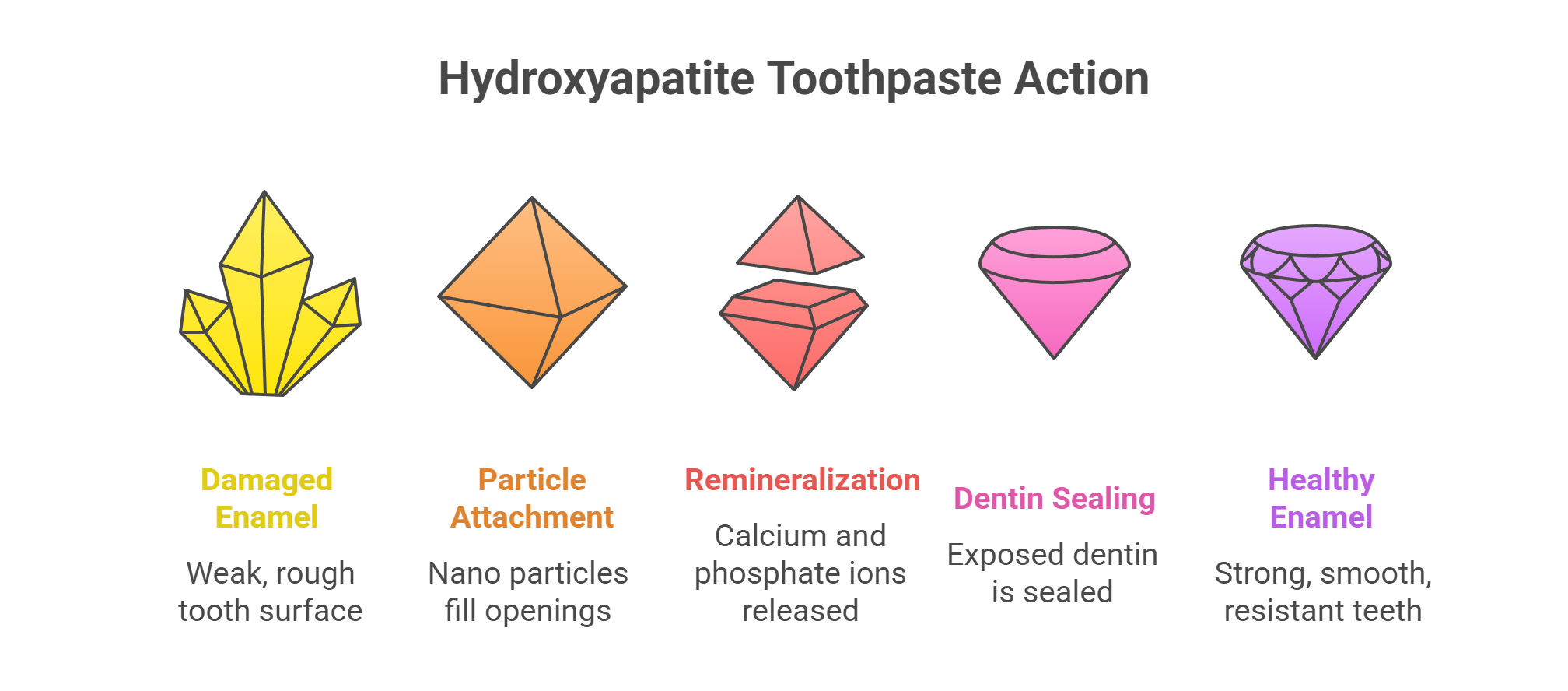
Hydroxyapatite toothpaste helps protect and rebuild enamel by working with your body’s natural tooth structure. Here’s how it supports better oral health:
-
Hydroxyapatite nanoparticles attach to damaged tooth surfaces, helping to fill in tiny openings caused by wear, acid, or tooth decay.
-
These particles mimic the body’s own enamel and release calcium and phosphate ions into weakened areas, promoting remineralization deep within the enamel.
-
The result is stronger, smoother enamel and healthier teeth that are more resistant to cavities and sensitivity.
-
Nano hydroxyapatite can reach areas that larger particles may miss, giving extra support where enamel has started to weaken.
-
It also helps seal exposed dentin, which eases discomfort from cold, heat, or sweets and supports long-term comfort.
Hydroxyapatite works with your enamel’s natural structure, making it a gentle yet powerful tool for restoring strength and shine. It supports daily oral hygiene without the potential risks of excessive fluoride exposure.
Because it’s unlike fluoride, it offers a safer alternative for those who are concerned about traditional ingredients. Whether you're managing tooth decay or simply looking to maintain a strong smile, hydroxyapatite is a modern, science-backed solution for promoting remineralization.
Benefits of Using Hydroxyapatite Toothpaste
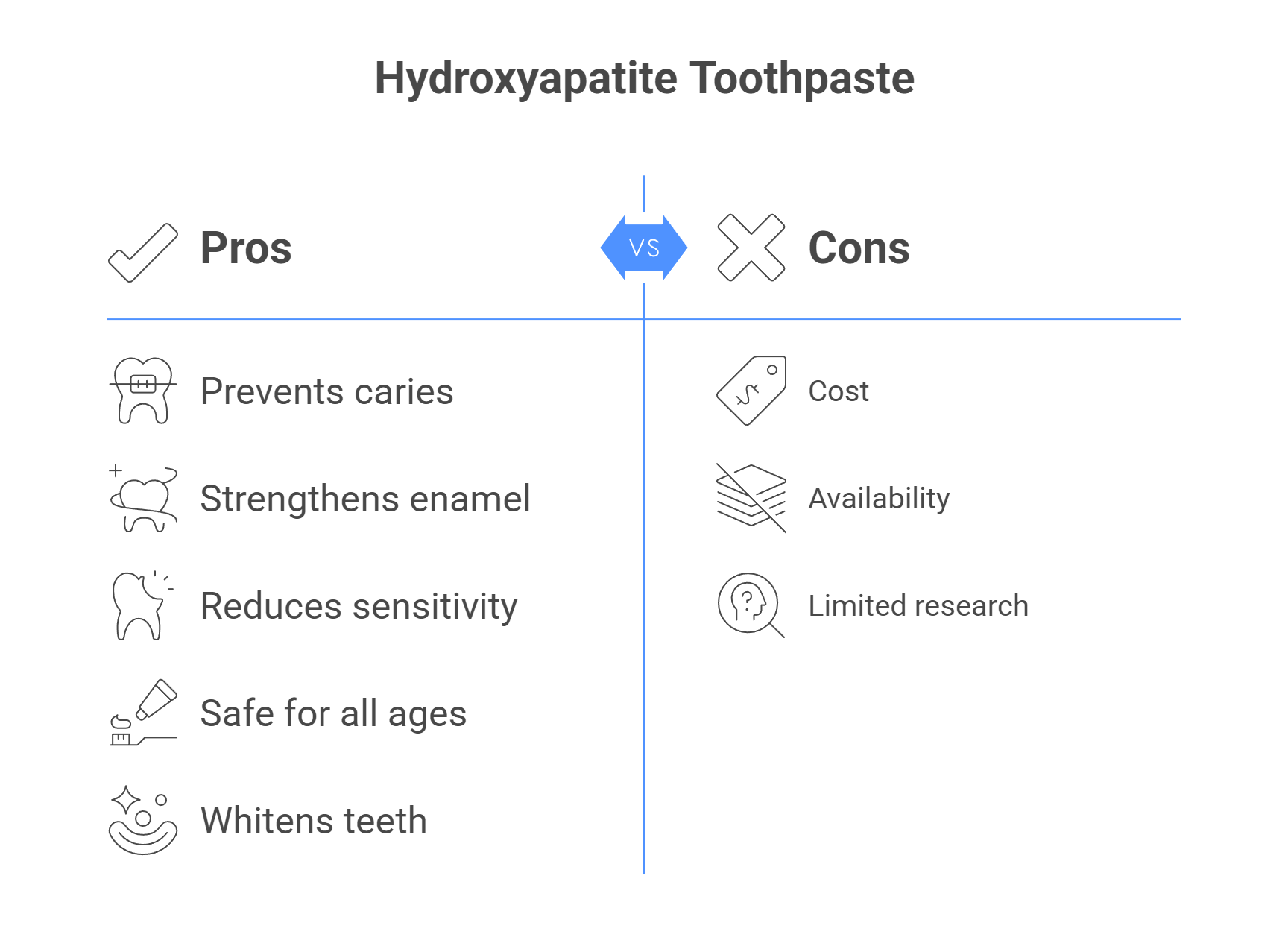
Hydroxyapatite toothpaste is gaining attention as a fluoride-free option that supports strong, healthy teeth. Its natural composition and gentle action make it ideal for daily oral care. Here are the main benefits:
-
Preventing dental caries: Hydroxyapatite helps prevent tooth decay by restoring and protecting enamel. It fills in microscopic holes where cavities can start, offering real protection against early decay.
-
Strengthening enamel through the remineralization process: This toothpaste supports the remineralization process by depositing calcium and phosphate directly onto the enamel. It mimics the natural mineral structure of your teeth, leading to smoother, healthier teeth over time.
-
Reducing tooth sensitivity: By sealing exposed dentin and strengthening the surface, hydroxyapatite helps relieve sensitivity caused by hot, cold, or sweet foods.
-
Safe for all ages and life stages: Because it contains a naturally occurring mineral, hydroxyapatite is gentle and non-toxic. It’s especially beneficial for children and others concerned about dental fluorosis or excessive fluoride exposure.
-
Promoting whiter, brighter teeth: Hydroxyapatite has a polishing effect that gently removes surface stains without harsh chemicals, offering a natural whitening benefit.
-
Compatible with biomimetic oral care: As a core ingredient in biomimetic oral care, hydroxyapatite fits easily into routines that focus on natural repair. Some formulations even support art enamel remineralization systems.
Potential Side Effects of Hydroxyapatite Toothpaste
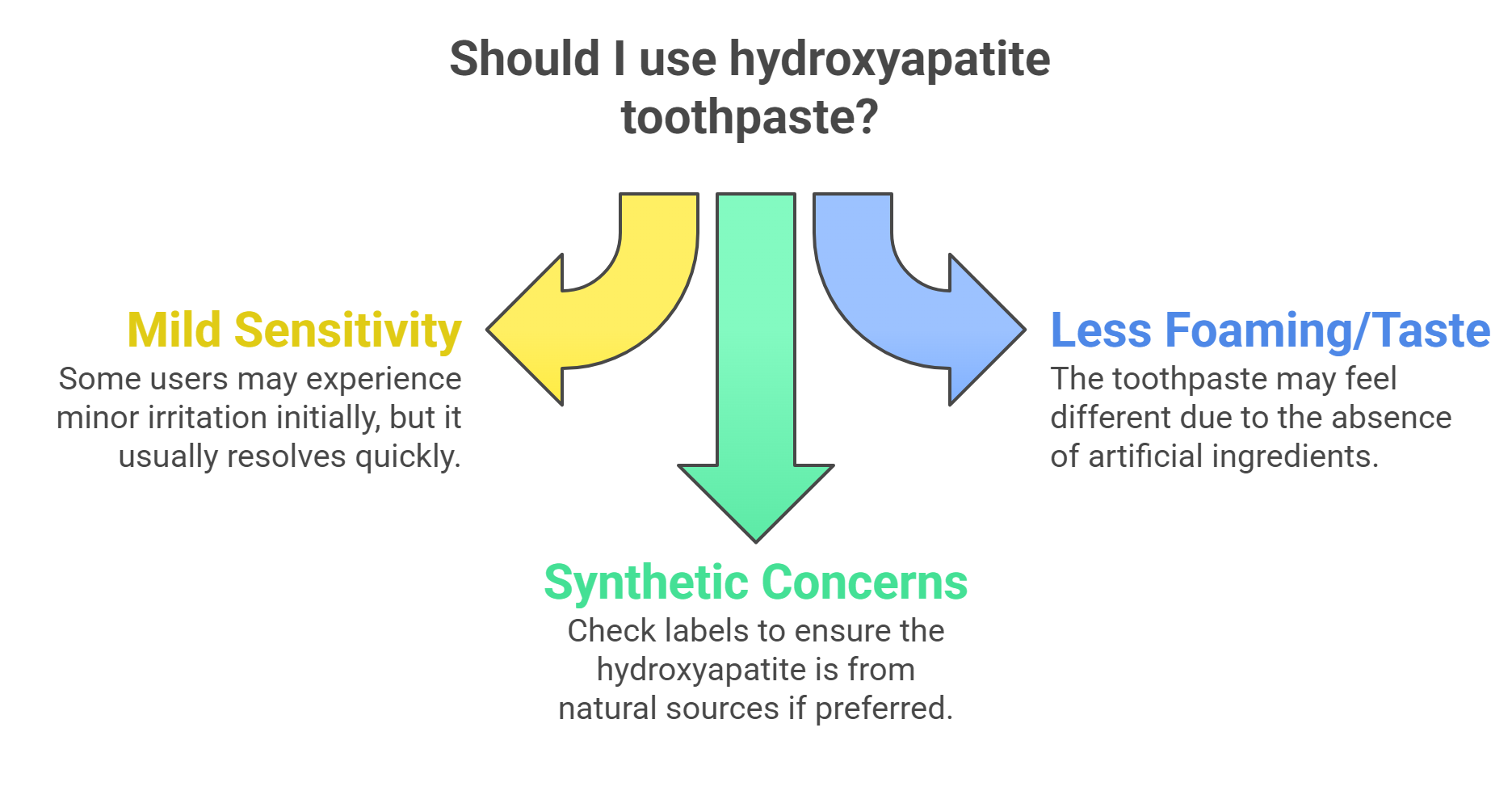
Hydroxyapatite toothpaste is generally well tolerated, but here are a few considerations:
-
Mild sensitivity in rare cases: Some people may experience minor irritation when first switching from fluoride, though this typically resolves quickly.
-
Less foaming or taste variation: Because many toothpastes containing hydroxyapatite are formulated without artificial ingredients, they may feel different than conventional pastes.
-
Synthetic hydroxyapatite concerns: While rare, some products may use synthetic hydroxyapatite. Always check labels if you prefer natural sources.
Overall, hydroxyapatite offers a gentle, science-backed approach to oral care, especially for those seeking a fluoride alternative that still supports cavity prevention, promoting remineralization, and a healthier smile.
Comparing Efficacy: Hydroxyapatite vs. Fluoride
Choosing the right toothpaste comes down to your needs for enamel repair, cavity prevention, and long-term safety. The table below compares how fluoride toothpaste and hydroxyapatite toothpaste stack up across different criteria, from effectiveness to cost and oral sensitivity, helping you make the most informed decision for maintaining oral health.

How to Choose the Right Toothpaste for Children
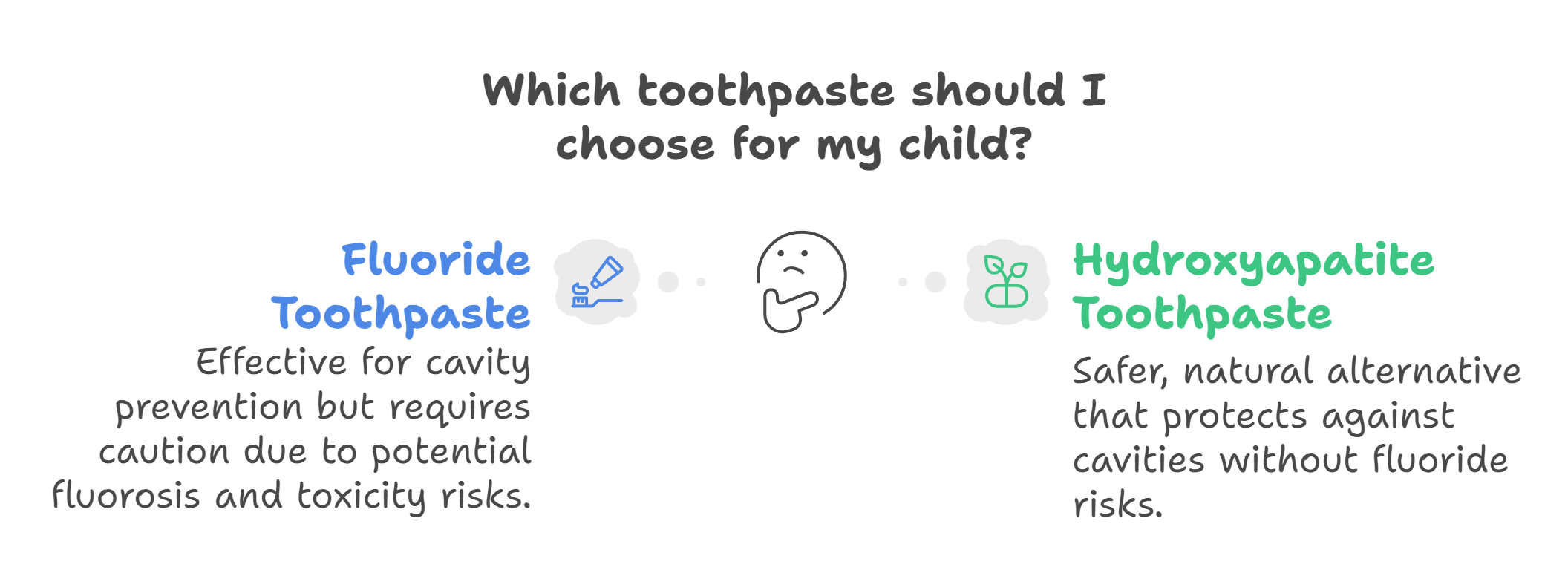
When it comes to children’s dental care, picking the right toothpaste is more than just choosing a fun flavor. It’s about protecting their developing teeth while avoiding unnecessary risks.
Why fluoride needs caution:
Young children often swallow toothpaste, and too much fluoride at an early age can lead to dental fluorosis, white spots or streaks on teeth caused by overexposure. In some cases, high fluoride doses may also contribute to fluoride toxicity, especially if ingested regularly.
Why hydroxyapatite is a safer choice:
Many parents are turning to hydroxyapatite toothpaste as a non-toxic and natural alternative. This ingredient is biomimetic, meaning it’s similar to the minerals already found in teeth, making it gentle and effective for kids. Best of all, fluoride free toothpaste made with hydroxyapatite helps protect against cavities without the risks linked to fluoride.
Pro Tips for parents:
-
Check the label: For toddlers and infants, use fluoride-free options unless a dentist recommends otherwise.
-
Match the age: Choose a toothpaste that’s age-appropriate with safe levels of active ingredients.
-
Ask your dentist: They can guide you based on your child’s needs, especially if your child is at higher risk for cavities.
-
Look for the ADA Seal: This ensures the product has met safety and efficacy standards for children’s use.
With the right toothpaste and brushing habits, you can help your child build a foundation for lifelong oral health, without unnecessary exposure to harsh ingredients.
Pregnancy-Safe Oral Care
Safe oral care during pregnancy is essential to protect both the mother and the developing fetus. Hydroxyapatite toothpaste is safe for use during pregnancy, posing no risk of fluorosis. Its natural composition makes it suitable for sensitive populations, including pregnant women.
Expecting mothers may prefer hydroxyapatite toothpaste as it avoids the potential risks associated with fluoride. Its non-toxic nature provides peace of mind for pregnant women concerned about dental health.
Professional Dentist's Guide on Switching Toothpaste
Switching from fluoride to hydroxyapatite toothpaste can benefit many individuals. Personal oral care needs and a dentist’s advice can guide this decision. Dentists have a favorable opinion of hydroxyapatite, considering it an effective alternative to fluoride toothpaste.
Consulting a dental professional for personalized recommendations ensures the chosen toothpaste aligns with an individual’s maintaining oral health needs and provides the best possible care.
Final Thought
Choosing the right toothpaste isn’t just about what’s popular, it’s about what works best for your smile and your lifestyle. Fluoride toothpaste has long been trusted for cavity protection and enamel support, but concerns around overexposure, especially for kids and those with sensitivities, have led many to explore safer alternatives.
Hydroxyapatite toothpaste offers a science-backed, fluoride-free solution that supports remineralization, strengthens enamel, and helps reduce tooth sensitivity—all while promoting a brighter, healthier smile.
If you're ready to make the switch, SNOW’s fluoride-free hydroxyapatite toothpaste is a gentle yet powerful upgrade. With clean ingredients like nano-hydroxyapatite, coconut oil, and xylitol, it not only helps whiten and protect enamel, but also keeps your mouth feeling fresh without any harsh chemicals.
It's simple, safe, and dentist-formulated for everyday use. Want a toothpaste that does more than just clean? Try SNOW—you’ll feel the difference.
Frequently Asked Questions
What are the main benefits of using fluoride toothpaste?
Using fluoride toothpaste effectively strengthens tooth enamel, helps prevent cavities through remineralization, and reduces tooth sensitivity, making it a key element in maintaining dental health.
What are the potential side effects of fluoride toothpaste?
Fluoride toothpaste can lead to dental fluorosis, skeletal fluorosis, and, in rare instances, acute fluoride toxicity. It's important to use it as directed to minimize these risks.
How does hydroxyapatite toothpaste work?
Hydroxyapatite toothpaste effectively restores lost minerals by depositing hydroxyapatite particles that integrate into the enamel structure, enhancing dental strength and health. This process contributes to remineralization and protection against decay.
Is hydroxyapatite toothpaste safe for children?
Hydroxyapatite toothpaste is a safe, non-toxic alternative to fluoride toothpaste for children's dental care. It effectively supports oral health without the risks associated with fluoride.
Can pregnant women use hydroxyapatite toothpaste?
Pregnant women can safely use hydroxyapatite toothpaste, as it poses no risk of fluorosis or other fluoride-related issues. This makes it a suitable option for maintaining oral health during pregnancy.














































